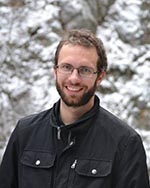
Mikkel Foltmar, one of the newest additions to the council’s volunteer roster, is almost as new to Alaska as he is to the council. However, he hasn’t wasted time putting his knowledge and experience to work to help protect the waters of Prince William Sound.
Originally from Belgium, Foltmar arrived here in May 2014 to join his then girlfriend of four years, Jessica, now his wife. When he first arrived, he couldn’t start working due to his visa status.
“I ended up going to the Public Lands Information Center [in Anchorage] for their Coffee with a Scientist programs,” Foltmar recalls. “Partially because free coffee is awesome, and partially because the programs were rather good, a lot of interesting talks.”
One of the programs was about the Exxon Valdez oil spill, presented by the council’s outreach coordinator, Lisa Matlock. Matlock encouraged him to join as a volunteer, and worked with him to find a good fit for his expertise.
Foltmar attended the Technical University of Denmark, where he earned a Bachelors of Science in Engineering with a focus in Applied Chemistry, and a Master’s in Environmental Engineering.
For his thesis, Foltmar helped test a prototype filtration system for stormwater drainage. A Danish company created the system, and together with the local municipality, wanted to find out if the system would clean the water well enough that it could be released into a nearby lake instead of sending it to a treatment facility twenty miles away. The company approached Foltmar’s university for help with testing the system. Foltmar ended up on the project, testing the stormwater runoff for oil pollution and toxicity.
“The goal was to see if the water became more toxic, whether it became less polluted with oil, or what exactly happened in the whole process of it getting filtered by the prototype.”
With his background, it was an easy decision for Foltmar to end up on the council’s Terminal Operations and Environmental Monitoring Committee, whose mission is to identify actual and potential sources of episodic and chronic pollution at the Valdez Marine Terminal.
Foltmar visited the terminal soon after joining the committee. He noticed the stormwater system at the terminal had some similarities to his thesis project. He realized that his previous experience might be useful in evaluating the system, so he talked about his idea with council project manager Austin Love. Love agreed, so the two worked up a project idea, which will be conducted next year.
Corrosion in pipes at the terminal is another issue the committee has been working on in recent months. Last year, Alyeska discovered that the corrosion in a 6-inch spot of pipe was worse than previously thought. It needed immediate attention since it was part of the piping to the tanker berths, and was located over the waters of Port Valdez.
“This was interesting because it was almost last minute that we got the email that Alyeska found corrosion,” Foltmar said. At first it seemed a bit worrisome, but Foltmar soon realized the system was working well.
“It showed not only how professional Alyeska actually is in dealing with these situations, but also shows the importance of the council,” Foltmar said.
“I was thinking about the situation,” he added. “Basically in the Gulf of Mexico oil spill, no one was really informed of anything until several weeks after it was a serious problem. In contrast, up here, a couple of days after they figure out there’s an issue, they confirm it, they let us know.”
“Ultimately, the communities are informed, and they are not kept in the dark,” he said. “They inform stakeholders without the whole community panicking.”
“That showcases the importance of the council, and showcases the differences the oil spill created in changing the culture at Alyeska.”